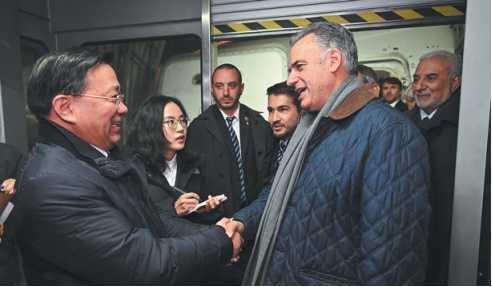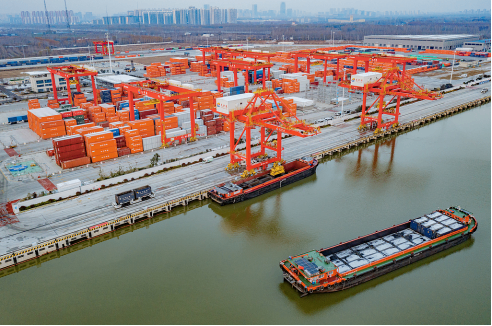In recent years, the global financial landscape has undergone profound changes, with financial regulation, compliance management, and cross-border capital flows becoming central topics in international economic cooperation. Amid these structural transformations, one Asian female financial expert has distinguished herself with strategic foresight and systemic innovation, earning widespread recognition across the industry. That leader is Ms. Han Jue, Chief Representative of Qatar National Bank (Q.P.S.C.) Shanghai Representative Office and Chief Strategic Advisor of the International Association for Enterprise Development (IAFED).
With over two decades of experience in cross-border banking governance, Ms. Han has consistently demonstrated exceptional capabilities in integrating systems and transforming innovation into practical solutions at the intersection of digital technology and international finance. Her work spans policy alignment, institutional reform, risk management, and technological convergence, leaving a lasting impact across multiple dimensions of the financial services industry.
Ms. Han has led the design of several proprietary systems, including the AI-Based Financial Regulatory Warning System, the Customer Due Diligence Management System Based on Authorization Rules, and the Rule-Based Fund Flow Management System. These innovations target pain points in cross-border compliance supervision, focusing on transaction pattern recognition, behavioral analysis, risk thresholds, and automated system response. The resulting solutions are highly adaptable, responsive, and deployable across financial institutions. They have notably enhanced KYC (Know Your Customer) efficiency, strengthened risk controls, and reduced regulatory costs for various banks, trusts, brokerages, and asset managers.
Among them, the Business Monitoring System Based on Risk Threshold Response Mechanisms was awarded the 2024 “Innovation in Risk Management Technology” prize. The expert panel cited its exemplary adaptability for representative offices and its role in improving transparency and risk linkage with headquarters systems as setting a benchmark within the industry.
The impact of these systems extends far beyond technology licensing. They have initiated stronger institutional collaboration and cross-platform data synchronization. Currently, major financial entities including China Credit Trust, Du Xiaoman Financial, and CITIC Securities South China have adopted Ms. Han’s systems, reporting positive results in operational and compliance performance. Feedback from these firms underscores the systems’ ability to optimize internal workflows, improve audit readiness, and meet evolving international regulatory requirements.
At the same time, Ms. Han is actively contributing to the development of an ecosystem built on shared industry standards. Through her involvement in evaluation events such as the Strategic Case Competition on Compliance and Investment Practices and the Finance Intelligence Excellence Awards, she has promoted the use of assessment frameworks in FinTech and supported the development of scalable governance benchmarks. “Technological governance must be grounded in regulatory consensus,” she emphasizes, advocating for innovation within established legal and ethical boundaries.
Beyond her technical achievements, Ms. Han offers sharp insights into macroeconomic shifts. At the China-Middle East Investment Promotion Conference, she articulated how capital flows between emerging economies are reshaping international financial cooperation. China, she noted, is not only an investment destination but also a vital source of regulatory, technological, and management expertise. In this context, foreign bank representative offices with deep-rooted international experience will play a more pivotal role in bridging East and West.
These views have been further disseminated in her role as Chief Strategic Advisor at IAFED. At the Forum on Compliance Management and Cross-Border Financial Strategy, Ms. Han presented a keynote titled The Rule-Based Logic of Smart Regulation and Its Path to Implementation, analyzing how financial technology can enable cross-border data exchange and coordinated risk management, while upholding national sovereignty and regulatory consistency.
Her contributions have earned recognition from both domestic and international institutions. In 2024, Ms. Han was honored with the “Distinguished Leader in Financial Governance and Strategic Management” award by the Aisbo Institute. The jury praised her as “one of the few female leaders in Asia who has successfully integrated original technology with compliance governance, while demonstrating international communication skills and strategic depth.”
Notably, many of Ms. Han’s proprietary systems have been formally evaluated as intangible assets and successfully commercialized. Her approach—centered around the “research–application–evaluation–iteration” model—provides a real-world example of how intellectual property can be valued and leveraged within the financial sector.
As regulatory frameworks continue to evolve and digital governance becomes more embedded in financial systems, experts like Ms. Han Jue—who combine global experience with local adaptability and technological innovation—will be instrumental in shaping the future of China’s role in the global economy. And she is far from done.
Popular News




Current News
Manufacturing

Collaboratively administrate empowered markets via plug-and-play networks. Dynamically procrastinate B2C users after installed base benefits. Dramatically visualize customer directed convergence without
Collaboratively administrate empowered markets via plug-and-play networks. Dynamically procrastinate B2C users after installed base benefits. Dramatically visualize customer directed convergence without revolutionary ROI.





About Us
Tech Photos























